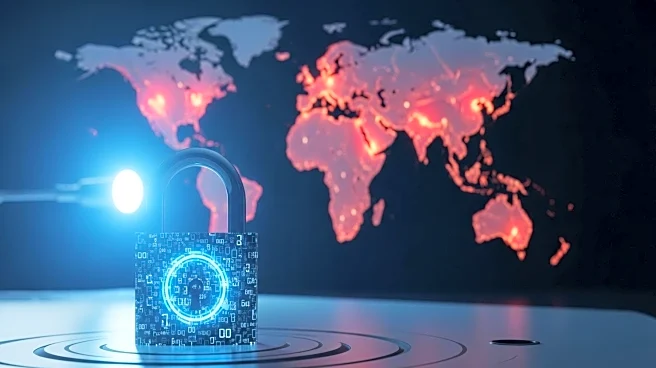What's Happening?
The U.S. Department of Justice has unsealed an indictment against Volodymyr Viktorovych Tymoshchuk, a Ukrainian national accused of orchestrating a widespread ransomware campaign. Tymoshchuk, known by several online aliases, allegedly developed and deployed ransomware variants such as Nefilim, LockerGoga, and MegaCortex. These attacks have targeted over 250 companies in the United States and hundreds more globally, causing tens of millions of dollars in damages. The indictment, filed in the Eastern District of New York, outlines how Tymoshchuk and his co-conspirators tailored their attacks to entities with annual revenues exceeding $100 million, specifically targeting companies in the U.S., Canada, and Australia. The State Department has announced rewards totaling up to $10 million for information leading to Tymoshchuk's arrest or conviction, and up to $1 million for information on other key leaders involved in deploying these ransomware variants.
Why It's Important?
This indictment highlights the significant threat posed by ransomware attacks to major corporations worldwide, particularly those in the United States. The financial impact of these attacks is substantial, with victims facing not only data loss and operational disruptions but also high costs for mitigation and recovery. The case underscores the ongoing challenge of cybersecurity in protecting sensitive data and maintaining business continuity. The U.S. government's proactive approach, including offering substantial rewards for information, reflects the seriousness with which it views cybercrime and its commitment to holding perpetrators accountable. This development may prompt companies to enhance their cybersecurity measures and collaborate more closely with law enforcement to prevent future attacks.
What's Next?
The indictment against Tymoshchuk is part of a broader effort by U.S. authorities to combat cybercrime. The FBI and other law enforcement agencies are expected to continue their global search for Tymoshchuk, who remains a fugitive. The case may lead to increased international cooperation in cybersecurity enforcement, as authorities from more than 10 European countries have already played key roles in the investigation. Companies affected by these ransomware attacks may seek to strengthen their cybersecurity defenses and work with law enforcement to identify vulnerabilities. The ongoing threat of ransomware may also drive legislative and policy changes aimed at improving cybersecurity standards and response strategies.










